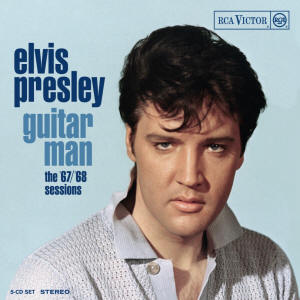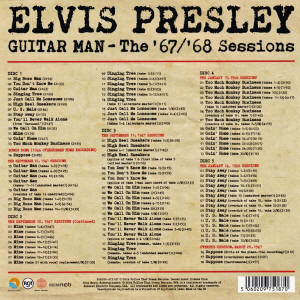(C) Sony Music Entertainment / Follow That Dream Records
Big Boss Man
The song was written by Al Smith and Luther Dixon and released by Jimmy Reed in 1960. Elvis recorded his version on September 10, 1967 within eleven takes. The narrator confronts his boss and tells him that he slave-drives him by letting him work all around the clock. The king sounds quite aressive and performs the r&b styled number extremely well. For his television special "SINGER presents Elvis" he re-recorded "Big Boss Man" and also performed it during his concerts from 1974 to 1977. In 1972 CAMDEN used the studio recording on the budget album "Elvis Sings Hits From His Movies - Volume 1".
You Don't Know MeThe ballad was written by Cindy Walker and Eddy Arnold, who also was the first to release "You Don't Know Me". On February 21, 1967 Elvis recorded twenty takes of the song, but the final attempt was only used for the movie. On September 11th the king taped two more performances, the record master was a splice of the first attempt and the final bars of the second one. Elvis performs "You Don't Know Me" very well and it's one of the best songs of the album. It's certainly a relief after two stinkers in a row. RCA Victor released the song on the flipside of "Big Boss Man" in 1967, five years later CAMDEN used it on their budget album "Elvis Sings Hits From His Movies - Volume 1".
Guitar ManHere we have the title track of this release. It was recorded on September 10, 1967. Elvis taped 12 takes of the song by Jerry Reed, who added his concise guitar play on the same day. The narrator chronicles his career as a musician and the king's enthusiasm for this song is obvious. In January 1968 RCA Victor also released "Guitar Man" on a single, the track was used again in 1972 on CAMDEN's budget album "Elvis Sings Hits From His Movies - Volume 1". For his tv special "SINGER presents Elvis" the king recorded a separate version of this song, which was featured on the long player "Elvis" in 1968.
Singing TreeThe singer mourns his lost love and does it in form of a country ballad. On September 10, 1967 Elvis recorded 13 takes, but wasn't able to reach a satisfactory result. So he taped five takes more on the following day. The final attempt was selected for release and enhanced with a harmony vocal. The result is a tad on the kitschy side, but I like it nevertheless.
Just Call Me LonesomeOn September 10, 1967 Elvis recorded 10 takes of "Just Call Me Lonesome", but in the end he thought his first attempt was the best one. The lovely country ballad was written by Rex Martin and recorded for the first time in 1953 by Eddy Arnold.
High Heel SneakersThe r&b number was written by Robert Higgenbotham and released by Tommy Tucker in 1964. Elvis taped it on September 11, 1967, the master is a shortened version of the 7th take. The king sounds very edgy and obviously motivated. Other cover versions of "High Heel Sneakers" are by The Rolling Stones, Janis Joplin, Led Zeppelin and Jerry Lee Lewis.
US Male"US Male" was written by Jerry Reed, who was also the first to release it. The narrator talks to his rival and threatens him with a diversity of hardship if he doesn't stop paying attention to his wife. Elvis mimes the over-confident Southener with audible joy, performs the talking-blues in heavy accent and even moves the birthplace of the narrator from Georgia to Mississippi to match his own biography. Just like the track on the a-side, "US Male" was recorded on January 16, 1968 at RCA Studio B in Nashville/Tennessee. The king had Mr. Reed flown in to perform his guitar overdubs. On the same day he also overdubed "Stay Away" and needed three takes to get it right.
Stay AwayThe ballad was written by Sid Tepper and Roy C. Bennett and is based on the British traditional "Greensleeves". Elvis recorded the song on January 16, 1968 at RCA Studio B in Nashville/Tennessee. The 15th attempt was approved for release. The narrator yearns to return home and see the canyons again. MGM used the song on the opening credits and showed great footage of Arizona's landscapes. Originally "Stay Away" was supposed to be released on the CAMDEN album "Almost In Love" (1970), but due to a mistake the record featured "Stay Away, Joe", which already had been issued on "Let's Be Friends" (1970). When CAMDEN re-released "Almost In Love" in 1973, they put the correct track on the record.
You'll Never Walk AloneElvis recorded "You'll Never Walk Alone" right after "We Call On Him" and delivered one of his very best performances. He seems to loose himself in the song, his voice is full of emotion and he sounds absolutely stunning. The master is a splice of takes 1 and 8. "You'll Never Walk Alone" was written by Richard Rogers and Oscar Hammerstein II in 1945 for a musical called "Carousel". In the same year Frank Sinatra also recorded a version of this classic.
We Call On HimFred Karger, Ben Weisman and Sid Wayne had written the ersatz-hymn for the movie "Easy Come, Easy Go", but finally it wasn't used for the project. And so Elvis recorded it on September 11, 1967 at RCA Studio B in Nashville/Tennessee for next year's Easter release. The king did the best he could, but even he wasn't able to raise "We Call On Him" above the level of an average movie tune.
MineThis ballad was also written by Tepper/Bennett, this time for the movie "Paradise, Hawaiian Style". At the time it was rejected (even though "Mine" had been the highlight of the soundtrack), but Elvis recorded it on September 10, 1967 at RCA Studio B in Nashville/Tennessee. Because no satisfactory performance emerged, the king's vocals were removed from the 21st take and Elvis re-recorded his part later. "Mine" is a beautiful song, that easily could have been used on a regular studio album, too.
Goin' HomeThe same applies here, even though Elvis himself didn't like the song. It was recorded at RCA Studio B in Nashville/Tennessee for the movie "Stay Away, Joe" on January 15, 1968. Maybe because of his dislike for the tune the king needed 30 takes to get it right.
Too Much Monkey BusinessThe 14th take was selected for release and enhanced with the guitar playing of Jerry Reed. He needed five takes for his part. The narrator describes several stages of his life. Elvis updated the lyrics and moved the military mission from Yokohama to Vietnam. He's really on fire and it's obvious, how much fun he has with this song. To me it's a mystery, why Elvis agreed to waste such a great track on a budget album. Well, maybe he simply didn't like his performance as much as I do.
SupposeThe selection of masters ends with this beautiful ballad by Silvia Dee and George Goehring. Originally Elvis had taped the song at home and given the recording to Felton Jarvis for post-production. But then he decided to re-record "Suppose" in a professional environment and recorded seven takes of this love song on June 20, 1967 at the MGM Soundstage in Hollywood/California.

